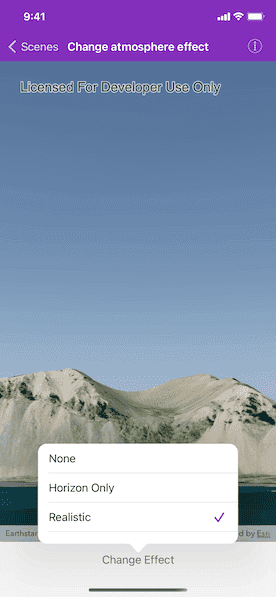Change the appearance of the atmosphere in a scene.

Use case
Atmospheric effect can be used to make the scene view look more realistic.
How to use the sample
Tap "Change Effect" and select one of the three available atmosphere effects. The sky will change to display the selected atmosphere effect.
How it works
- Create an
AGSSceneand display it in anAGSSceneView. - Change the scene view's
atmosphereEffectproperty to the desired atmosphere effect.
Relevant API
- AGSAtmosphereEffect
- AGSScene
- AGSSceneView
Additional information
There are three atmosphere effect options:
- Realistic - A realistic atmosphere effect is applied over the entire surface.
- Horizon only - Atmosphere effect applied to the sky (horizon) only.
- None - No atmosphere effect. The sky is rendered black with a starfield consisting of randomly placed white dots.
Tags
atmosphere, horizon, sky
Sample Code
ChangeAtmosphereEffectViewController.swift
// Copyright 2018 Esri.
//
// Licensed under the Apache License, Version 2.0 (the "License");
// you may not use this file except in compliance with the License.
// You may obtain a copy of the License at
//
// http://www.apache.org/licenses/LICENSE-2.0
//
// Unless required by applicable law or agreed to in writing, software
// distributed under the License is distributed on an "AS IS" BASIS,
// WITHOUT WARRANTIES OR CONDITIONS OF ANY KIND, either express or implied.
// See the License for the specific language governing permissions and
// limitations under the License.
import UIKit
import ArcGIS
class ChangeAtmosphereEffectViewController: UIViewController {
/// The view for displaying the scene.
@IBOutlet private weak var sceneView: AGSSceneView!
/// The labels for the atmosphere effect options, corresponding to the cases of
/// `AGSAtmosphereEffect` in the order of their raw values.
private let atmosphereEffectOptionLabels = ["None", "Horizon Only", "Realistic"]
override func viewDidLoad() {
super.viewDidLoad()
/// The scene for the scene view.
let scene = AGSScene(basemapStyle: .arcGISImagery)
// add the scene to the scene view
sceneView.scene = scene
/// The surface for the scene.
let surface = AGSSurface()
/// The URL of the remote service serving elevation data.
let elevationURL = URL(string: "https://elevation3d.arcgis.com/arcgis/rest/services/WorldElevation3D/Terrain3D/ImageServer")!
/// The elevation source for the 3D terrain effect.
let elevationSource = AGSArcGISTiledElevationSource(url: elevationURL)
// add the elevation source to the surface
surface.elevationSources.append(elevationSource)
// add the surface to the scene
scene.baseSurface = surface
/// The initial camera position for the scene view.
let camera = AGSCamera(
latitude: 64.416919,
longitude: -14.483728,
altitude: 100,
heading: 318,
pitch: 105,
roll: 0
)
// set the camera for the scene view
sceneView.setViewpointCamera(camera)
// add the source code button item to the right of navigation bar
(navigationItem.rightBarButtonItem as! SourceCodeBarButtonItem).filenames = [
"ChangeAtmosphereEffectViewController",
"OptionsTableViewController"
]
}
/// The action handler for the "Change Effect" bar button item.
@IBAction func changeEffectAction(_ sender: UIBarButtonItem) {
// The raw values of the AGSAtmosphereEffect cases are 0 through 2, so we
// can use `rawValue` as the selection index.
let selectedIndex = sceneView.atmosphereEffect.rawValue
/// A table view controller allowing selection between the provided options.
let controller = OptionsTableViewController(labels: atmosphereEffectOptionLabels, selectedIndex: selectedIndex) { [weak self] (selectedIndex) in
/// The effect for the selected option.
let selectedEffect = AGSAtmosphereEffect(rawValue: selectedIndex)!
// update the `atmosphereEffect` of the scene view with the selected effect
self?.sceneView.atmosphereEffect = selectedEffect
}
// configure the options controller to be a popover anchored to the bar button item
controller.modalPresentationStyle = .popover
controller.presentationController?.delegate = self
controller.popoverPresentationController?.barButtonItem = sender
controller.popoverPresentationController?.passthroughViews?.append(sceneView)
controller.preferredContentSize = CGSize(width: 300, height: 150)
// show the options controller
present(controller, animated: true)
}
}
extension ChangeAtmosphereEffectViewController: UIAdaptivePresentationControllerDelegate {
func adaptivePresentationStyle(for controller: UIPresentationController, traitCollection: UITraitCollection) -> UIModalPresentationStyle {
// return none to ensure the options controller is shown as a popover even on small displays
return .none
}
}